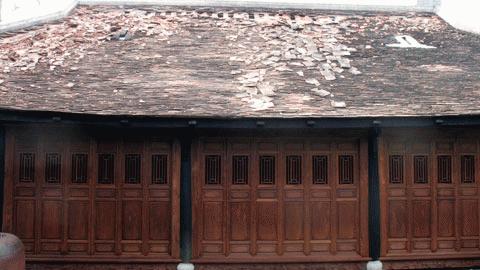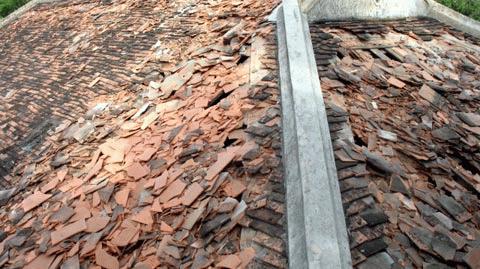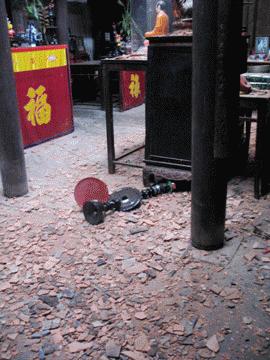Jun 25, 2010 9:12 PMPublicPageviews 1
Nhà thờ Thái tộc bị đập phá: Bất lực đứng nhìn?
Cập nhật lúc 15:44, Thứ Ba, 22/06/2010 (GMT+7)
,
- Trước vụ việc phá hoại nghiêm trọng xảy ra đêm 19/6, lãnh đao tỉnh TT-Huế chỉ xuống TP Huế. Lãnh đạo TP Huế chỉ lên lãnh đạo tỉnh TT-Huế. Còn Công an TP Huế thì điều tra hết năm này qua năm khác vẫn… không ra thủ phạm!
Tan nát nhà thờ hơn 100 năm của cả một gia tộc
Trong khi vụ tranh chấp đất đai ở khu nhà thờ Thái tộc (120 Nguyễn Phúc Nguyên, phường Hương Long, TP Huế) giữa bà Thái Thị Kim Lan (đại diện Thái tộc) và bà Nguyễn Thị Thuý Hằng (con ông Nguyễn Văn Kế, bị gia tộc họ Thái tố cáo lấn chiếm đất đai xây dựng công trình trái phép) vẫn chưa có hồi kết thì ngày 21/6, báo VietNamNet tiếp tục nhận được đơn kêu cứu khẩn cấp của bà Thái Thị Kim Lan.
|
|
Ngôi từ đường của gia tộc họ Thái ở Huế bị phá hoại nghiêm trọng
|
Bà Lan cho biết, tối 19/6, người trông coi Từ đường của gia tộc họ Thái vào nhà thờ thắp hương bình thường, không có vấn đề gì xảy ra. Khoảng 8h30 sáng hôm sau, bà Lan lên Từ đường. Vừa đến ngoài sân thì bà Nguyễn Thị Thuý Hằng đứng ở phía đất đối diện Từ đường (địa điểm thuộc phạm vi tranh chấp) đã vỗ tay, gọi tên bà Lan và nói: “Mi lên sửa mái nhà đó hẳn” cùng những lời chủi rủa thô bỉ khác.
Do đã quá quen thuộc với những hành vi đe doạ, chửi bới của bà Hằng và tưởng bà ta nói về vụ đập phá nhà thờ xảy ra hồi tháng 3/2010 mà gia tộc họ Thái vừa cho sửa chữa nên bà Lan vẫn giữ thái độ im lặng. Đến khi mở cửa bước vào nhà thờ, bà mới chết lặng cả người khi chứng kiến một cảnh tượng tàn phá hết sức nặng nề.
“Toàn bộ ngói lợp trên mái Từ đường có diện tích 120m2 bị đập đập phá. Hai mái ngói của ba căn nhà thờ chính điện bị đập tan, ngói bể đầy bàn thờ, mái của chái tây bị đập vỡ toàn bộ, đồ thờ trên bàn thờ Phật bị vỡ nát. Bàn thờ tổ tiên, hương hỏa bị đạp đổ, vỡ nát tứ tung. Trên nền Từ đường phủ đầy một lớp gạch vỡ. Nhang, đèn, kính… rơi rớt ngổn ngang!” – bà Thái Thị Kim Lan bức xúc cho hay.
Theo bà Lan cho biết, đây không phải là lần đầu mà đã là lần thứ 6 trong vòng hai năm qua, Từ đường của Thái tộc vốn đã tồn tại hơn 100 năm trong một quần thể kiến trúc đáng được xem là một di sản văn hoá của cố đô Huế, là nơi thờ hương hỏa, tổ tiên của cả một dòng họ, bị đập phá.
|
|
Phần mái ở chái tây ngôi từ đường bị đập vỡ
|
Tháng 3 và 4/2009, tất cả lu vại cổ trưng bày trong vườn của Từ đường bị đập vỡ. Ngày 2/10/2009, cây cối bị chặt đứt một cách tàn bạo. Ngày 3/10/2009, những cây quý còn sót lại (cây sanh, cây tùng) bị chặt đứt và mái nhà thờ ông bà tổ tiên bị phá gần một nửa. Các ngày 21, 22, 23/2/2010, nhà thờ bị ném đá, đập phá đồ đạc, chặt phá cây cối, gây thiệt hại lớn và người giữ nhà của Từ đường bị đe doạ giết chết.
“Gần đây nhất, hồi tháng 3/2010 cũng đã xảy ra vụ ném đá, đập mái ngói, nổ bom xăng trên mái nhà… Tuy nhiên, so với vụ việc cách đây 3 tháng thì vụ việc xảy ra đêm19/6 còn gây thiệt hại nặng nề gấp 10 lần. Thiệt hại vật chất đã trầm trọng mà thịệt hại tinh thần càng gấp bội. Tất cả đều xuất phát, bắt nguồn từ phía nhà bà Nguyễn Thị Thúy Hằng”. Bà Thái Thị Kim Lan nói.
Chưa bàn đến chuyện tranh chấp đất đai thì việc nhà thờ gia tộc họ Thái liên tục bị phá hoại đã cho thấy an ninh công cộng trên địa bàn đang bị buông lỏng. Những kẻ vi phạm pháp luật đang ngang nhiên thách đố, coi thường luật pháp khiến tình hình trật tự trị an và đời sống, sinh hoạt của người dân trở nên bất an. Không những thế, việc huỷ hoại các giá trị truyền thống, di sản văn hoá tâm linh của cả một gia tộc, đạp đổ bàn thờ tổ tiên của dòng họ là sự chà đạp lên các giá trị đạo đức, lối sống của xã hội.
Tỉnh chỉ xuống, thành chỉ lên!
Bà Thái Thị Kim Lan là Việt kiều sống tại Đức, là GS-TS của trường Đại học Munich, Chủ tịch Hội Giao lưu văn hoá Đức – Á của Munich và từng được nhận danh hiệu “Vinh danh nước Việt năm 2006”. Rất nhiều công việc quan trọng đang chờ bà ở Đức, nhưng do quá đau lòng trước cảnh đất đai của nhà thờ gia tộc bị lấn chiếm trái phép, Từ đường bị đập phá nên bà cứ lần lữa mãi chưa trở về giải quyết.
|
|
Mái của ngôi từ đường bị vỡ toác nghiêm trọng
|
Tuy nhiên chiều 21/6, bà Thái Thị Kim Lan cho biết, do công việc quá cấp bách, không thể trì hoãn hơn nữa nên sáng mai 22/6, bà phải vào TP.HCM để bay qua Đức. Tâm nguyện trước khi lên đường của bà là được biết chính quyền địa phương và ngành chức năng đã thể hiện trách nhiệm như thế nào trước vụ việc nghiêm trọng này?
Chúng tôi đã gọi điện thoại cho ông Ngô Hoà, Phó Chủ tịch phụ trách văn xã của UBND tỉnh TT-Huế. Ông Hoà cho hay, khu nhà thờ của gia tộc họ Thái không phải “di tích” nên không thuộc trách nhiệm quản lý của ông. Tuy nhiên, ông xác nhận là tại đây đang xảy ra vụ tranh chấp đất đai.
“Tôi không phụ trách đất đai. Phụ trách đất đai trước đây là chị Hoà (bà Nguyễn Thị Thuý Hoà, vừa nghỉ hưu) nhưng tôi cũng đã có ý kiến rồi, cũng đã mời hai bên lên để hoà giải nhưng không được. Về mặt pháp lý thì phía bên kia (tức bà Nguyễn Thị Thuý Hằng) cũng có căn cứ pháp lý. Do vậy phải thương lượng giữa đôi bên, nhưng thương lượng không được. Tôi chỉ biết như thế thôi vì tôi không phụ trách vấn đề đất đai” – ông Ngô Hoà nói.
“Nhưng thưa ông, quần thể kiến trúc độc đáo ở khu nhà thờ Thái tộc đã trên 100 tuổi cũng chính là phần không thể thiếu góp phần tạo nên một cố đô Huế trở thành Di sản văn hoá thế giới như hiện nay. Như vậy, việc đập phá nhà thờ này có khác gì đập phá chính một phần văn hoá vốn mang bản sắc rất riêng, rất độc đáo của Huế?” – chúng tôi đặt câu hỏi.
|
|
Nền nhà của ngôi từ đường phủ đầy gạch, ngói vỡ
|
Mặc dù cho biết là nói chuyện với bà Thái Thị Kim Lan mãi vì ở gần nhà, nhưng ông Ngô Hoà vẫn tỏ ra ngạc nhiên khi nghe đến chuyện nhà thờ Thái tộc bị đập phá: “Họ có đập phá nhà thờ đâu. Có phải đập phá cái nhà thờ đấy không?”. Đến khi nghe thuật lại sự việc xảy ra đêm19/6, ông Ngô Hoà bảo sẽ kiểm tra lại và trả lời sau.
Tuy nhiên, khi chúng tôi đăng ký sáng mai 22/6 sẽ ra Huế để làm việc trực tiếp về kết quả “kiểm tra” thì ông Ngô Hoà trả lời: “Tôi đang đau, nằm ở nhà. Cái này thuộc về TP Huế. Anh có thể gọi điện cho Chủ tịch UBND TP Huế là ông Phan Trọng Vinh để hỏi (về chuyện tranh chấp đất đai – PV). Còn về chuyện văn hoá thì tôi đang đau, ở nhà, mới đau này hôm nay, có đi làm đâu!”. Và đó là lý do để ông Ngô Hoà từ chối làm việc trực tiếp với PV VietNamNet.
Chúng tôi tiếp tục gọi điện cho ông Phan Ngọc Thọ, Phó Chủ tịch phụ trách lĩnh vực đất đai của UBND tỉnh TT-Huế. Vừa nghe chúng tôi đặt vấn đề về vụ phá hoại nhà thờ Thái tộc đêm 19/6, ông Thọ đáp ngay: “Tôi đang chuẩn bị họp giao ban. Đây là vụ việc nằm trong phạm vi quản lý của TP Huế. Anh phải hỏi ông Phan Trọng Vinh, Chủ tịch UBND TP Huế là người quản lý trên địa bàn!”.
Theo “hướng dẫn” của hai ông Phó Chủ tịch UBND tỉnh TT-Huế, chúng tôi gọi điện cho ông Phan Trọng Vinh để tìm hiểu lãnh đạo TP Huế đã chỉ đạo xử lý như thế nào về vụ phá hoại nhà thờ Thái tộc. Câu trả lời của ông Vinh còn… cụt lủn hơn: “Cậu nên nhớ rằng việc giải quyết vụ đó thuộc thẩm quyền của tỉnh!”. “Nhưng trên tỉnh bảo vụ việc này thuộc thẩm quyền giải quyết của UBND TP Huế?” – chúng tôi hỏi tiếp. “Nếu thế thì thôi nhé!” – ông Phan Ngọc Vinh đáp và từ chối trả lời tiếp.
|
|
Đồ thờ cúng trên bàn thờ bị xô xuống lăn lóc dưới đất!
|
Nghiệp vụ điều tra yếu kém hay… bao che?
Bà Thái Thị Kim Lan cho hay, sau những lần nhà thờ tộc Thái bị phá hoại trong suốt 2 năm qua, bà đều gọi điện báo cho Công an phường Hương Long và Công an TP Huế. Lực lượng công an địa phương đã nhiều lần về điều tra, nhưng kết quả thì chưa thấy đâu, còn các vụ phá hoại thì vẫn tiếp tục tái diễn, lần sau nghiêm trọng hơn lần trước.
Sau vụ việc đêm 19/6, một lần nữa bà Kim Lan đặt niềm tin vào Công an phường Hương Long và Công an TP Huế. Họ cũng đã cử lực lượng đến hiện trường để xem xét. Chiều 21/6, chúng tôi gọi điện cho ông Đặng Ngọc Sơn, Trưởng Công an TP Huế để tìm hiểu kết quả điều tra. Ông trả lời: “Vụ việc này làm từ lâu rồi, làm từ trước. Hiện nay anh em vẫn đang làm!”. Chúng tôi nhắc lại vụ việc vừa xảy ra đêm 19/6, ông Sơn đáp ngay: “Cái đó tôi biết rồi, giao anh em làm từ lâu đến nay rồi”!
“Thưa ông, Công an TP Huế điều tra vụ việc này đã lâu, không biết đã có kết quả chưa?” – “Chưa chưa, anh em vẫn đang làm. Vì nó đập xong nó bỏ trốn. Anh em đang truy xét, đang làm thôi!” – ông Sơn trả lời. “Được biết Công an TP Huế đã điều tra, truy xét vụ này đến 5 lần rồi…” – chưa kịp để chúng tôi hỏi xong câu hỏi, ông Sơn đáp ngay: “Lâu rồi, rất lâu rồi, vẫn đang làm thôi!!”. Chúng tôi hỏi tiếp: “Đến bây giờ vẫn chưa có dấu hiệu gì sao?”. “Thì cũng làm, chưa có kết luận cuối cùng thôi, chưa có dấu hiệu. Tôi đang họp chút!”.
Trong khi kẻ xấu vẫn tiếp tục các hành vi phá hoại nhà thờ của cả một gia tộc, đe doạ tính mạng của người dân thì lãnh đạo tỉnh TT-Huế chỉ xuống lãnh đạo TP Huế, còn lãnh đạo TP lại chỉ lên lãnh đạo tỉnh. Đặc biệt, việc điều tra của lực lượng công an trên địa bàn kéo dài năm này qua năm khác vẫn không đưa ra được kết luận là do trình độ nghiệp vụ yếu kém hay do bao che? Vậy thì người dân còn biết kêu cứu vào đâu?



